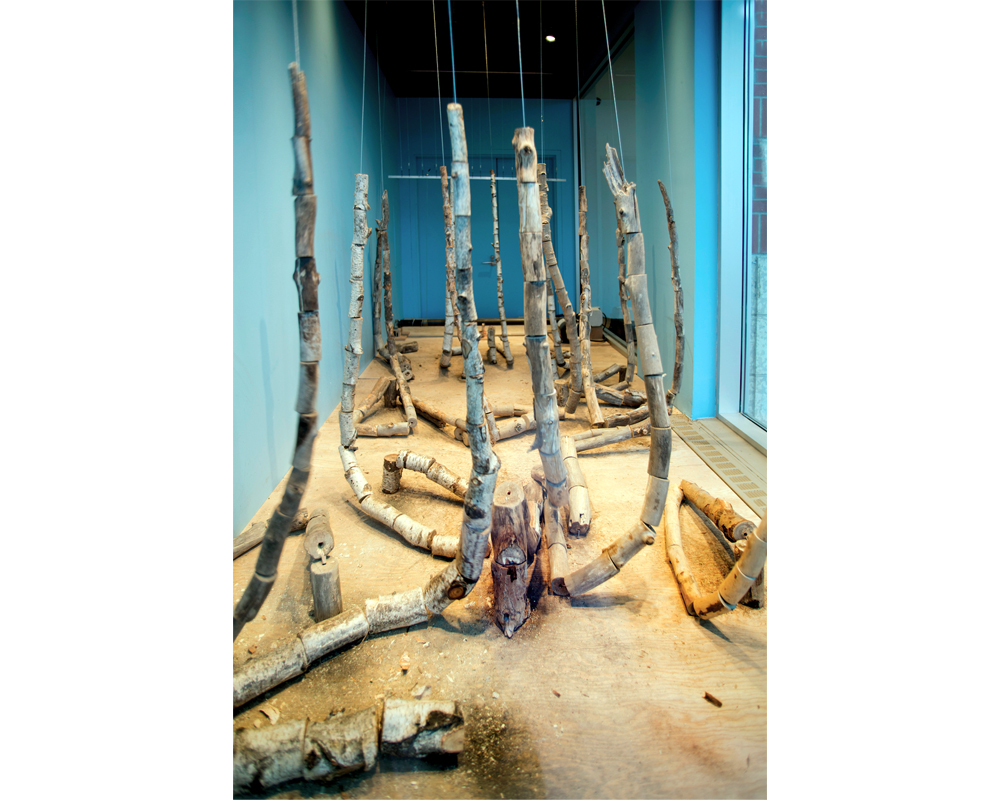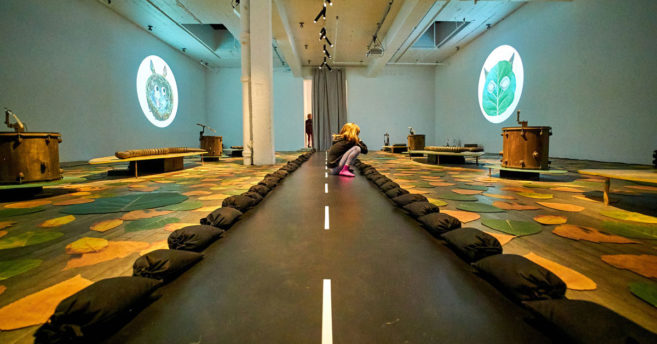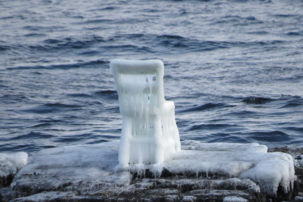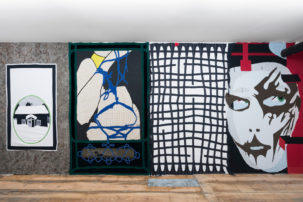Days after seeing Corinne Thiessen’s project Chronic, at the Project Space of the Esker Foundation, I was reminded of it while driving through the Alberta prairie lands. Under a low horizon and an endless sky, the land was spotted with the bobbing heads of derricks, machines attached to oilrigs. Sourcing the fuel for our vehicle (and the sure undoing of our environment), the derricks slowly rolled back and forth over the maw in the ground that this black liquid springs from, and I saw anew Thiessen’s mechanical trees, artificially erected in the exhibition space, tumbling together and rising again. The derricks, like Thiessen’s machine-driven trees, are ominous and solemn, standing still, then dipping low.
Each of Thiessen’s small trees has been divided into sections and strung through with thick, cabled wire. Attached to a mechanical arm that slowly rolls up and down, the trees reach up, rising like the precarious legs of newborn calves. As the arm winds back up to the ceiling, the trees slowly tumble into piles on the floor. With each circuit the arm makes, pulling the trees to standing position and letting them fall anew, the trees tumble into a different formation, forever changing. They appear to crumble, crashing into one another—a cacophonous disintegration.
Thiessen recently attended a residency led by Peter von Tiesenhausen at the Banff Centre, and the land-art veteran’s influence is clear in the piece. The small trees, tumbling down and standing up again, resemble trees that often surround houses in the prairie farmlands of Alberta, like a gathering of broken soldiers against the wind, or a living wall that breaks the ruinous wind from eroding homes, belongings, the hardened souls of farmers. The piece’s repetition, a regrowth followed inevitably by destruction, evokes the environmental concerns at the forefront of protests around climate change happening across the country in a simple, eloquent gesture.
With the federal election just months away, the supporters of the Enbridge Northern Gateway Pipelines are waiting anxiously to push the project through to completion, which would see oil tankers navigating the treacherous Douglas Strait from Kitimat to the Lower Mainland. British Columbians are shaking their heads in the wake of the tragic oil spill in English Bay. Albertan oil workers face a precarious future as oil prices drop, and jobs that were plentiful in the tar sands grow scarcer, making the unreliable nature of the market and the transportation of oil patently clear. Thiessen’s project, though simple in its presentation, draws all these issues to our minds as each tree stands up, only to be brought down again. The work also points to the clear-cutting of British Columbia’s forests for the lumber and pulp-mill industry, obvious to anyone travelling through the nearly ruined northern forests of BC, where red trees show signs of pine-beetle infestation, and large swaths of land are noticeably stripped bare by the forestry industry.
With these environmental issues in mind, Thiessen’s Chronic could not be timelier. She metaphorically redraws a collapsing environment. Her work places the sanctity of the forest at the fore, and by tracing the delicate balance of the trees’ lifespans from saplings, to full-grown trees, to fallen vegetation that feeds the forest floor, Thiessen reminds viewers of our reliance on natural resources and the devastating effects of this dependency. Chronic provides an incubated arboreal experience—mechanical, living, destroyed, repeated on a loop.









